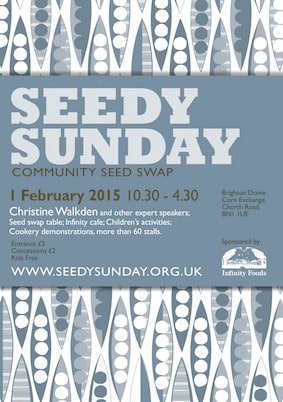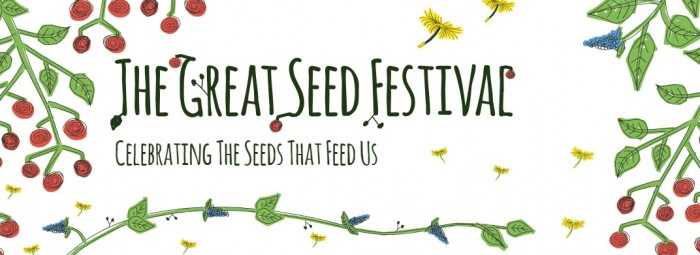Greenhouse Pioneer: Steve Bustin, Chair of Seedy Sunday

Seedy Sunday is the UK’s biggest community seed swap, with an event taking place every February in Brighton. It’s also a campaign to protect biodiversity and protest against the increasing control of the seed supply by a handful of large companies.
The event has been running for 14 years now and Steve Bustin has been on the chair of committee for the past four years. The next Seedy Sunday takes place on Sunday 1st February 2015. We talk to Steve about why it’s such an important part of any growers’ calendar.
Tell us about Seedy Sunday – what’s your mission?
Seedy Sunday is a community seed swap. We bring people together in sowing, growing, eating and using what they have grown.
What motivates you?
 It’s a sense of community, of involvement and a sense of sharing and there are important environmental and political messages underlying what is a really fun event.
It’s a sense of community, of involvement and a sense of sharing and there are important environmental and political messages underlying what is a really fun event.
Growing seeds that are not bought from major seed companies is important – particularly seeds suited to your local environment that produce great crops so that people can eat well.
Politically it’s about making sure that control of the seed market doesn’t fall in to the hands of the major seed companies which are just driven by profit and who would dearly love to see events like ours halted.
What is your greatest achievement to date?
I think Seedy Sunday’s greatest achievement is the fact that we are now 14 years old. It’s grown from a really small community event with a few hundred people to a major event in the gardening calendar with a few thousand people. We really are striking a chord not only with keen growers in the gardening community but also with the messages we are trying to communicate.
What are the challenges you face?
There are laws that are before the EU that would ban events like Seedy Sunday and could even ban individual gardeners or allotment holders from saving their own seeds or swapping them with other people. It’s part of the bigger seed legislation which was voted down in March but it’s undoubtedly going to come back because big companies like Monsanto are behind it and there’s so much profit involved.
The problem is that the major seed companies want to control the seed market and say what we can grow and they want to be able to sell us the seed. So they are very keen to stop events like ours going ahead, despite the fact that we don’t have the same varieties as theirs – ours are very much more heritage varieties and local varieties and the old varieties that have natural resistance rather than varieties that have had resistance bred into them in some way.
 What’s getting you fired up and excited?
What’s getting you fired up and excited?
The actual event is less than two weeks away – and it’s going to be a really exciting event. We’ve grown and grown over the past 14 years and I have high hopes that it’s going to be better than ever before.
Longer-term, we’re hoping to establish a network of seed swaps around the UK and internationally and be able to spread the word even further.
Where do you want to take Seedy Sunday next?
There are already seed swaps popping up all over the country and we have resources on our website to help people set up their own seed swaps. I hope we’ll carry on inspiring people to that and it would be lovely to see one in every major town.
What can individuals do to make a difference?
Find out where you can swap seeds locally and identify the flowers and vegetables that grow well for you. If they grow well for you it’s likely that they’ll grow well for your neighbours because they share the same climate and all those factors – if you’ve got something that grows well make sure you share it so that other people can benefit too.
If you were Prime Minister for a day, what would youdo?
That’s easy! I’d put gardening and cooking back in the National Curriculum. It’s just a complete shocker that they aren’t there and that children aren’t being taught how they grow the things they eat and how to cook them to eat healthily and cheaply – to me it’s a crime that they are not there. Making that link between what’s on your plate and where it comes from is so crucial.
What’s the coolest project or product you’ve come across?
The Great Seed Festival is a brilliant seed campaigns that is really fighting for the issue of seed sovereignty and who owns our seeds. It promotes not just the swapping of seeds but the natural selection of seeds rather than it being done by GM or through a laboratory.
Can you recommend a life- or game-changing book for our readers?
I’d recommend two. Firstly, The Manual of Seed Saving by Andrea Heistinger – subtitled ‘harvesting, storing and sowing techniques for vegetables, herbs and fruits’ – is a really good, practical guide to saving seeds. And secondly, Seed Swap by Josie Jeffery – the gardener’s guide to swapping seeds.
The first one is probably aimed at people growing on a smallholding or on a more commercial basis and the second is more for gardeners and allotment holders.
What do you listen to when you’re cooking dinner?
The Archers!
What’s the best advice you’ve ever been given?
‘If it doesn’t work, try it again’. So often we try something once and it doesn’t work so we just give up – in the garden, kitchen and in life generally I think we give up too quickly. Growing can take a long time to get right – it often takes a few years of crop failure until you work out what you should be doing – or are forced to look up what you should be doing!
Can you leave us with who’d be your Eco Hero?
I’d have to sayJohn Twitchen – he works as a communicator on recycling and waste issues and he has a passion for it that I find infectious and that makes people want to listen to him.
For more information visit the Seedy Sunday website, follow @SeedySundayBton on Twitter and Like Seedy Sunday on Facebook.



